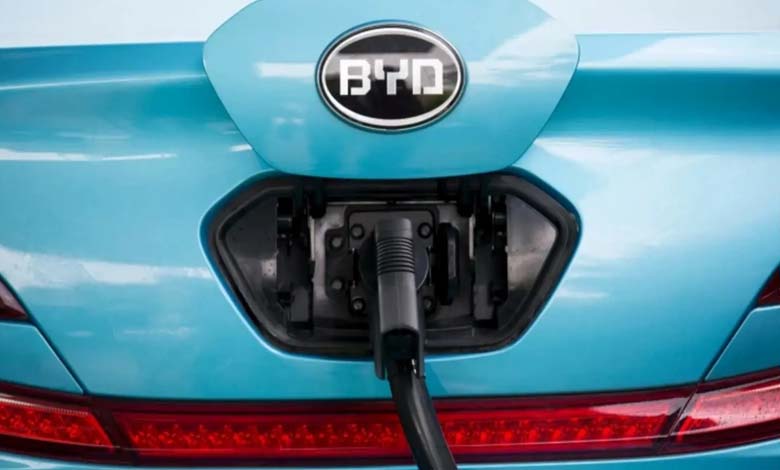Just Like Refueling: Electric Car Charging in Minutes Coming Soon

The Chinese electric vehicle (EV) manufacturer BYD has recently made a significant announcement that could transform the automotive industry, not only in China but globally. The company revealed a series of groundbreaking innovations that, if successfully implemented, have the potential to catapult both BYD and the entire Chinese automotive sector to the forefront of the zero-emission electric vehicle market. These advancements promise to revolutionize the way we think about electric transportation and could be pivotal in shaping the future of the global automotive industry.
-
Electric Cars More Likely to Hit Pedestrians Than Other Vehicles
-
After 10 years of work, “Apple” abandons its electric car manufacturing project
Among the most remarkable innovations introduced by BYD is their ultra-fast charging technology. According to the company’s official statements, this new charging technology will be capable of adding a staggering 400 kilometers of range to an electric vehicle’s battery in just five minutes. This is a breakthrough in EV charging technology that is set to completely change the dynamics of the electric vehicle market. Such rapid charging capabilities, which are nearly equivalent to the time it takes to refuel a conventional gasoline-powered car, are seen as a crucial step toward the widespread adoption of electric vehicles. It addresses one of the most persistent concerns of EV owners: the time it takes to charge their vehicle compared to the quick refueling process of traditional gasoline vehicles.
The ability to rapidly recharge electric cars could drastically improve the practicality and convenience of owning an EV, making it a more attractive option for those who might otherwise hesitate due to concerns about charging time. This, in turn, could lead to a significant surge in the adoption of electric vehicles across various demographics, helping to pave the way for a more sustainable and environmentally friendly future.
-
30% of Global Plastic Pollution is caused by “Car Tires”
-
China Overtakes the United States in Self-Driving Cars
Key Factors Contributing to Ultra-Fast Charging
Achieving charging speeds that allow for 400 kilometers of range to be added in just five minutes is no small feat, and BYD has incorporated several advanced technologies and components to make this possible. The company utilizes high-performance silicon carbide power chips that are capable of handling extremely high voltages of up to 1,500 volts. These chips have been developed in-house by BYD’s research and development team and are a critical component in enabling ultra-fast charging speeds. Silicon carbide, a material known for its efficiency and heat resistance, plays a pivotal role in increasing the energy transfer rate during charging, making the process much faster than traditional methods.
Additionally, BYD has designed 1-megawatt charging stations that are capable of delivering the immense power required to recharge an electric vehicle at this speed. These stations are tailored to the needs of ultra-fast charging and have been built to handle the high energy demands of modern electric vehicles. The combination of these cutting-edge charging stations and the silicon carbide chips is what enables the lightning-fast recharge times that are expected to become the new standard for electric vehicles in the near future.
-
Iraqi Man Miraculously Revived After 30 Minutes of Cardiac Arrest
-
California bans gasoline car sales by 2035
BYD’s developments also align with the broader trends in the Chinese electric vehicle market, which has seen a rapid and impressive surge in EV adoption. In 2025, electric vehicle sales in China rose by a remarkable 38.2% compared to the previous year, a testament to the growing popularity and demand for electric vehicles. This rise in EV sales is largely attributed to the affordability of locally produced electric cars from manufacturers like BYD, Chery, XPeng, and Nio. These companies have made electric vehicles accessible to a wider range of consumers by offering competitive pricing while maintaining high standards of performance, design, and quality. As a result, China has become one of the largest and fastest-growing markets for electric vehicles in the world.
Overcoming the Obstacles: Challenges in Implementing Ultra-Fast Charging Globally
While the potential of ultra-fast charging technology is undeniably exciting, there are several significant challenges that need to be addressed before it can be implemented on a global scale. The most pressing issue lies in the power infrastructure of many countries, which is not currently equipped to handle the immense energy demands required for ultra-fast charging. Unlike China, which has a highly advanced and robust energy network, many other nations’ power grids are simply not capable of supporting the large-scale deployment of 1-megawatt charging stations. This presents a substantial hurdle, as the infrastructure in these countries would need to be significantly upgraded to accommodate the power requirements of such high-capacity charging stations.
-
Turkey Turns to Psychiatrists to Understand Reckless Drivers’ Behavior
-
Aston Martin Unveils Its New Iconic Model
Currently, the fastest charging stations available worldwide operate at a maximum power of 350 kilowatts, a far cry from the 1 megawatt required for BYD’s ultra-fast charging technology. Even these 350-kilowatt stations remain relatively rare and are often limited to certain high-demand areas, such as major urban centers or specific regions with established EV infrastructure. The challenge, therefore, is not only about developing faster charging technology but also ensuring that the energy grid can handle the widespread installation and operation of these high-capacity charging stations.
Furthermore, the lack of universal access to fast-charging stations remains a significant barrier to the widespread adoption of electric vehicles. While some regions, particularly in developed countries, have made considerable progress in expanding EV charging networks, others still face limited availability, making it difficult for electric car owners to find convenient charging stations when they need them the most. This discrepancy in charging infrastructure is one of the key factors holding back the global adoption of electric vehicles.
-
The spread of car theft phenomenon in Canada and the government is considering solutions
-
After 10 years of work, “Apple” abandons its electric car manufacturing project
The Road Ahead: Will Ultra-Fast Charging Become the New Standard?
Despite the challenges, there is no doubt that ultra-fast charging technology holds the potential to revolutionize the electric vehicle market. If the technological and infrastructure challenges can be overcome, it could drastically reduce one of the biggest barriers to EV adoption—charging time. Imagine being able to add hundreds of kilometers of range to your electric car in just a few minutes, making long road trips and spontaneous travel as convenient as with traditional gasoline-powered vehicles. This would not only increase the appeal of electric cars but could also help further reduce global carbon emissions by accelerating the shift away from fossil fuel-powered transportation.
In conclusion, while the global rollout of ultra-fast charging stations will take time and require significant investment in energy infrastructure, the innovations brought forward by BYD represent a promising step forward for the electric vehicle industry. As more manufacturers and governments embrace the potential of ultra-fast charging, we may see a future where electric vehicles are not only more efficient and sustainable but also as convenient to charge as it is to fuel a traditional car. The road to mass adoption may be long, but the advancements being made today are laying the groundwork for a cleaner, greener, and more electrified future.












